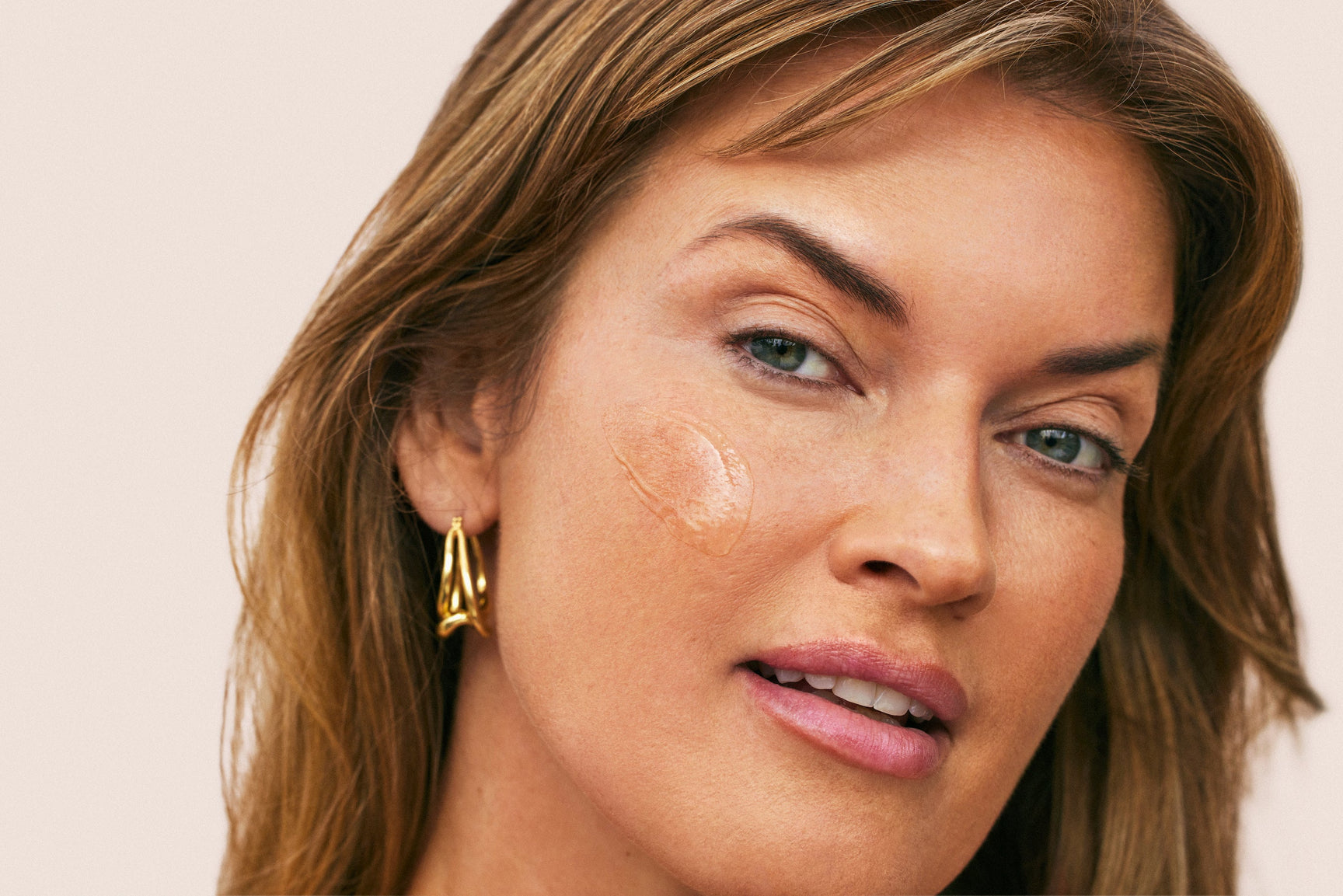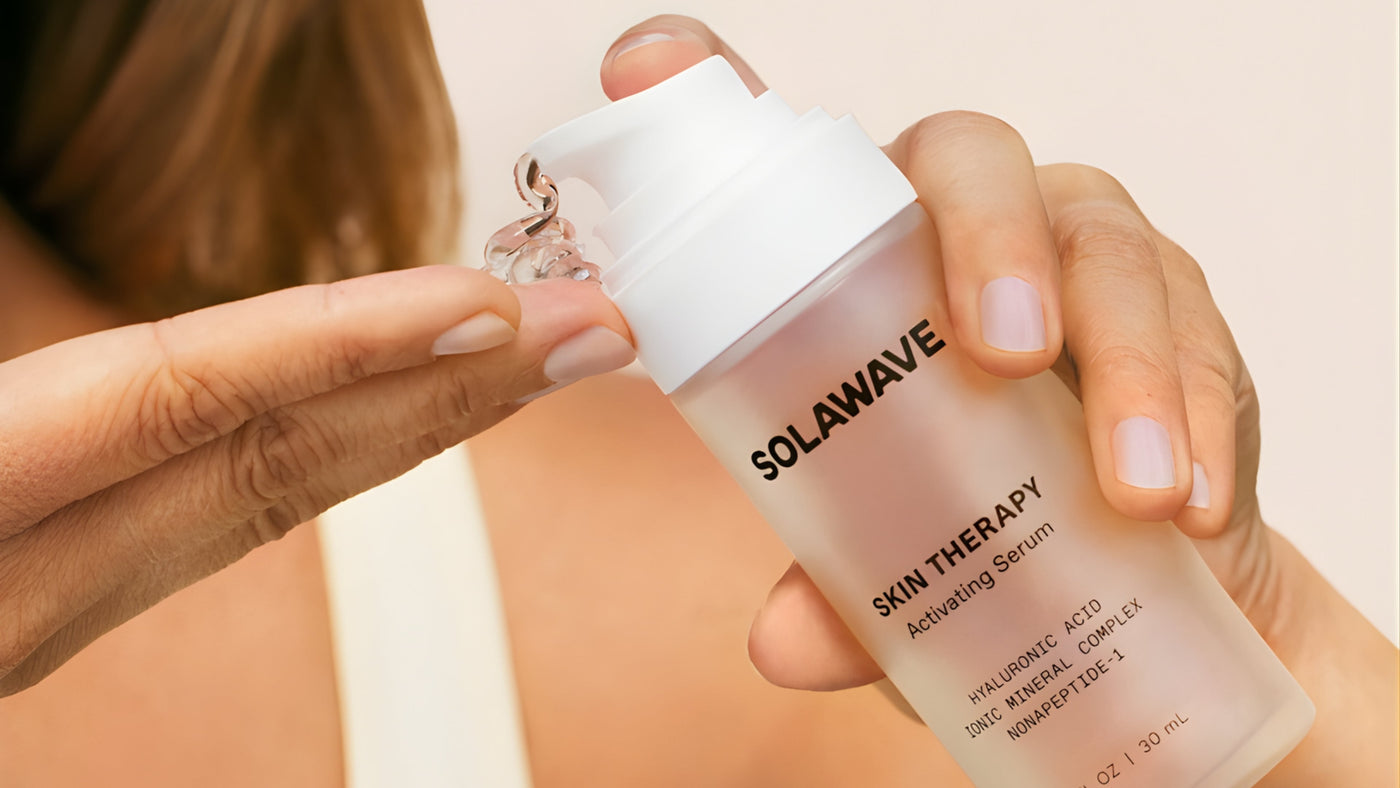

Why Are Peptides Good For Skin?
If you’ve been exploring new ways to upgrade your skincare routine, you’ve probably seen the word “peptides” popping up in your search results as a key ingredient in serums and creams and face masks and more. But what exactly are peptides, and why are they the star ingredient in so many products?
In short, peptides are short chains of amino acids, which are the basic building blocks that make up proteins in your skin, like collagen. When used in skincare, peptides can help support your skin’s natural processes, leading to a healthier-looking, more radiant complexion.
Let's talk about the science behind peptides, how exactly they work, and why they’re such a must-have for anyone looking to visibly rejuvenate their skin. Whether you’re curious about the latest skincare trends or want to understand how peptides can help reduce the appearance of fine lines and support firmer-looking skin, you’re in the right place.
What Are Peptides, Exactly?
Peptides are short chains of amino acids, which are the basic molecules your body uses to build proteins. Amino acids are often called the “building blocks of life” because they combine in different ways to create all the proteins your body needs, including those that keep your skin looking healthy and vibrant.
To understand peptides, it helps to picture a protein as a long train, with each train car representing an amino acid. When you have just a few train cars linked together, you get a peptide. When you have a long train with many cars, you get a protein.
In your skin, proteins like collagen and elastin are essential for keeping your skin looking firm, smooth, and resilient. Collagen, for example, is a protein made up of thousands of amino acids arranged in a specific order.
Peptides are essentially small fragments of these larger proteins. Because they’re smaller, peptides can more easily penetrate the outer layer of your skin when applied topically. Once inside, they help support healthy collagen production, which ultimately helps repair visible signs of skin aging.
Here’s how they all fit together:
-
Amino acids: The smallest units, like single beads.
-
Peptides: Short chains of amino acids, like a small string of beads.
-
Proteins: Long, complex chains of amino acids, like a full necklace made from many beads.
Ultimately, peptides help reinforce your skin’s natural structure, making them a valuable addition to products designed to visibly rejuvenate and support your skin.
How Do Peptides Work in Skincare?
Peptides are a key ingredient in many topical skincare products, especially serums, creams, and masks. When you apply these products to your skin, the peptides are able to penetrate the outer layer of skin, and because peptides are smaller than full proteins, they can be more easily absorbed, making them especially effective.
One of the most important roles peptides play is supporting healthy collagen production. Collagen is the protein that helps keep your skin looking firm, smooth, and youthful. As you age, your skin naturally produces less collagen, which can lead to visible signs of skin aging like fine lines and wrinkles, so the support from peptides is welcome for visibly smoothing these lines.
Peptides vs. Other Skincare Ingredients
When you’re building a skincare routine, it’s easy to feel overwhelmed by the sheer number of ingredients available. Peptides, retinol, hyaluronic acid, and vitamin C are some of the most talked-about options, so as we've covered peptides, we're also going to cover how these other ingredients (that are commonly used alongside peptides) work, so you can create a routine that supports your healthiest-looking skin.
Retinol: Retinol is a form of vitamin A that’s widely recognized for its ability to fight visible signs of skin aging. It works by encouraging skin cell turnover, which means it helps your skin shed old, dull cells and reveal fresher, smoother-looking skin underneath. Retinol also supports collagen production, which can help reduce the look of fine lines and wrinkles. However, retinol can sometimes cause dryness, redness, or irritation, especially if your skin is sensitive or you’re new to using it.
Hyaluronic Acid: Hyaluronic acid is a powerful humectant, meaning it draws moisture into your skin and helps retain it. This ingredient is naturally found in your skin, but like collagen, its natural levels decrease over time. Adding hyaluronic acid to your routine can help your skin look plumper and more hydrated. It’s gentle, non-irritating, and works well for all skin types, making it a staple for any routine.
Vitamin C: Vitamin C is a potent antioxidant that helps protect your skin from environmental stressors, such as pollution and UV exposure. It also supports brighter-looking skin by reducing the appearance of dark spots and uneven skin tone. Vitamin C can help your skin look more radiant and even, but it can sometimes be unstable or irritating, especially in higher concentrations.
How To Use Peptides With Other Popular Skincare Ingredients
Peptides work exceptionally well alongside other skincare ingredients. For example, using peptides with hyaluronic acid can help your skin look both firmer and more hydrated — hyaluronic acid draws in moisture, while peptides support your skin’s structure.
Peptides can also be paired with vitamin C for a routine that targets both brightness and firmness, helping you achieve a luminous, even-toned complexion.
When it comes to retinol, peptides can help soothe and support your skin, making it easier to tolerate retinol’s more intense effects. Layering a peptide serum or cream after applying retinol can help reinforce your skin’s barrier and reduce the appearance of irritation.
What Not To Use With Peptides
While peptides are compatible with most ingredients, it’s best to avoid using them with formulas that have a very low pH, such as some strong exfoliating acids. Extremely acidic environments can break down peptides, making them less effective. That said, for most routines, peptides can be seamlessly integrated with your favorite products!
How To Incorporate Peptides Into Your Skincare Routine
With so many peptide-based products available, here's how to choose the right formulas and use them in a way that maximizes their benefits.
Choose peptide-first products. Peptides are found in a variety of skincare products, including serums, creams, and masks. Serums typically contain a higher concentration of active ingredients and are designed to penetrate deeply, making them a great option if you want targeted results. Creams and moisturizers with peptides help lock in hydration while supporting your skin’s structure. Masks infused with peptides can provide an extra boost of nourishment and are perfect for a weekly treatment. When selecting a product, look for peptides listed near the top of the ingredient list, which indicates a higher concentration.
Use products in the right order. Peptides are gentle and versatile, making them easy to layer with other popular skincare ingredients. After cleansing and toning, apply your peptide serum first, as serums are usually the most lightweight and absorb quickly. Follow with other treatments, such as vitamin C or hyaluronic acid serums, and then seal everything in with a moisturizer. If you use retinol, apply it after your peptide serum but before your moisturizer. Peptides can help soothe and support your skin, especially if you’re using more active ingredients like retinol or exfoliating acids. (Need a little more help on which products to use when? Check out our guide on how to layer skincare products!)
Be consistent. Peptides are gentle enough for daily use, both morning and night. Consistency is key: use peptide-based products regularly to give your skin the ongoing support it needs to look firm and plump. For best results, follow the instructions on your chosen product and give your skin time to respond. Visible improvements, such as smoother, firmer-looking skin, typically appear with continued use over several weeks.
Product Spotlight: Plumping Peptide Serum With Solabiome™
Meet your new go-to for visibly radiant, plump-looking, hydrated skin: the Plumping Peptide Serum With Solabiome™. This science-forward serum is designed to soothe, nurture, and visibly rejuvenate your complexion, making it an ideal addition to any skincare routine.
Key ingredients include:
-
5% Solabiome™: A unique complex of skin-soothing synbiotics and barrier-strengthening ingredients to help your skin look and feel its best.
-
Triple Hyaluronic Acid: A powerful humectant that draws in and retains moisture, leaving your skin feeling soft, supple, and luminous.
-
Avocado Peptides: These deeply hydrate and help to visibly strengthen your skin, supporting a plumper, rejuvenated appearance.
The Plumping Peptide Serum is lightweight, fragrance-free, vegan, and dermatologist-tested, making it suitable for all skin types. It layers effortlessly under other skincare products or makeup, and can be used daily for ongoing benefits. After cleansing and toning, simply press a few drops into your skin and follow with your favorite moisturizer.
If you’re looking to upgrade your skincare routine, this serum is a smart choice for anyone seeking a refreshed, glowing complexion.
You can also find peptides as a key ingredient in all of our LightBoost Topicals, which are formulated to complement your at-home Light Therapy devices so you can achieve comprehensive, professional-level results from the comfort of your own space.
Frequently Asked Questions About Peptides in Skincare
Are peptides safe for all skin types? Yes, peptides are generally well-tolerated by all skin types, including sensitive skin. Because they are gentle and non-irritating, peptides can be a great option if you’re looking to support healthier-looking skin without causing redness or discomfort.
Can you use peptides with other active ingredients? Absolutely. Peptides pair well with most skincare ingredients, including hyaluronic acid, vitamin C, and niacinamide. They can also be used alongside retinol, and may even help soothe and support your skin when using more potent actives. However, it’s best to avoid combining peptides with highly acidic products, as a very low pH can reduce their effectiveness.
Can I use peptides with Red Light Therapy?
Yes, you can use peptides with Red Light Therapy. In fact, combining peptide-based skincare products with Red Light Therapy can help you achieve even more visible benefits. Red Light Therapy supports healthy collagen production and helps rejuvenate the appearance of your skin, while peptides provide the building blocks your skin needs to look firmer and more radiant.
Applying a peptide serum before or after your Red Light Therapy session, (make sure to do it before if it's a LightBoost product, as these help boost the effects of Light Therapy), can help maximize hydration and support a refreshed-looking complexion. This combination is gentle and suitable for most skin types, making it an excellent way to upgrade your at-home skincare routine.
How long does it take to see results from peptides? Visible improvements from peptides, such as smoother, firmer-looking skin, typically appear after several weeks of consistent use. Everyone’s skin is unique, so results may vary, but regular application is key for the best outcome.
Do peptides help with the appearance of fine lines and wrinkles? Yes, peptides are known for supporting healthy collagen production, which can help reduce the look of fine lines and wrinkles over time. They also help your skin appear plumper and healthier.
Can peptides help with hydration? While peptides themselves don’t directly hydrate the skin, many peptide-based products are formulated with hydrating ingredients like hyaluronic acid. This combination helps your skin look and feel more supple and luminous.
How should I apply peptide products in my routine? Apply peptide serums or creams after cleansing and toning, but before heavier moisturizers or oils. This allows the peptides to be absorbed effectively and work alongside other beneficial ingredients.
Can I use peptides every day? Yes, peptides are gentle enough for daily use, both morning and night. Consistent application helps maintain their visible benefits and supports your skin’s natural processes.
Do peptides have any side effects? Peptides are considered safe and non-irritating for most people. If you have particularly sensitive skin or allergies, it’s always a good idea to patch test a new product before applying it to your entire face.
Are peptide products suitable for mature skin? Definitely. Peptides are especially beneficial for mature skin, as they help support the skin’s natural structure and address visible signs of skin aging, such as loss of firmness and the appearance of fine lines.
Conclusion
Peptides can be powerful allies in your skincare routine because they support healthy collagen production and help your skin look firmer, smoother, and more radiant. If you’re looking to visibly rejuvenate your skin and address signs of aging, consider adding peptides to your daily regimen for healthier-looking skin!
As powerful as peptides are, they play just a small part of the ideal collagen-supporting skin rejuvenation routine. What's the star player, you ask? Look no further than Red Light Therapy.
If you haven't heard of at-home Red Light Therapy before, we recommend starting your journey by taking a look at our Red Light Therapy Before & After Results, and you'll see for yourself the kind of transformative results this professional-grade skincare tech can bring!
Sources:



















